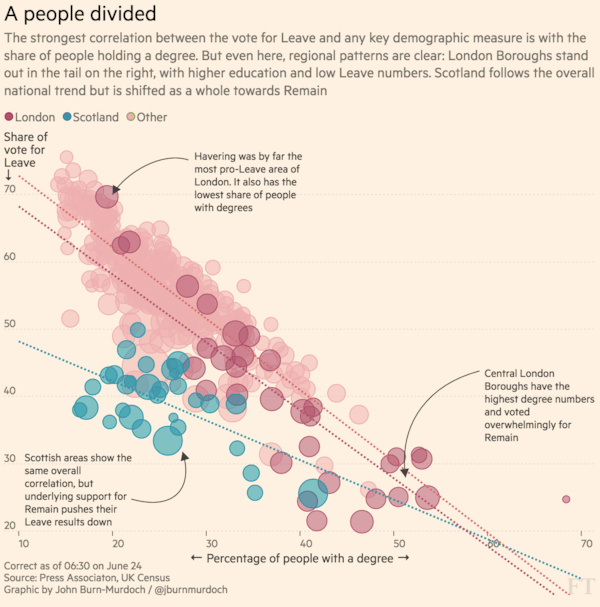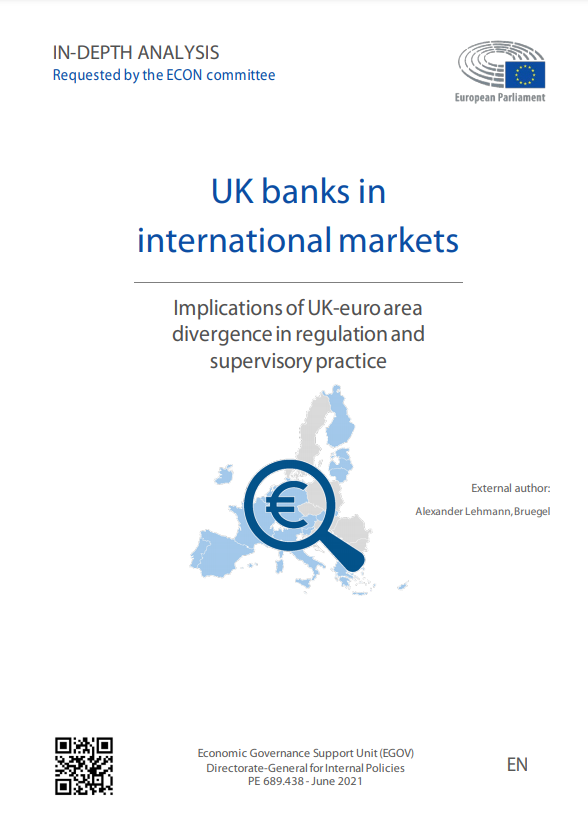Blog Post
The great risk shift and populism
What’s at stake: For many commentators, Brexit was the signal of a broad populist backlash and illustrated the need to articulate policies that address the grievances of those citizens who have been left behind by recent economic changes.
Brexit and the new fault lines
Martin Sandbu writes that since Brexit has shaken elites out of their complacency and got them to think belatedly about what policies are needed to help those left behind by the economic changes of recent decades. Philippe Legrain writes that the “Brexit” vote could presage a broader nationalist, anti-establishment, anti-immigration backlash in many of the world’s democracies.
Nouriel Roubini writes that the United Kingdom’s narrow vote to leave the European Union had specific British causes. And yet it is also signaling a broad populist/nationalist backlash – at least in advanced economies – against globalization, free trade, offshoring, labor migration, market-oriented policies, supranational authorities, and even technological change. In the “Brexit” vote, the fault lines were clear: rich versus poor, gainers versus losers from trade/globalization, skilled versus unskilled, educated versus less educated, young versus old, urban versus rural, and diverse versus more homogenous communities. The same fault lines are appearing in other advanced economies, including the United States and continental Europe.
Source: FT Data

Paul De Grauwe argues that the dissatisfaction about the European project has to do with the inability of the European Union to set up a mechanism that protects the losers of globalization. The problem of the European Union today is that, instead of helping those who suffer from globalization, it has set up policies that hurt these people even more. It is no surprise that the losers revolt. If the EU continues with austerity and structural reforms, revolt will spread and will take the form of attempts to exit the Union. It is time the European Union takes the side of the losers of globalization instead of pushing for policies that mainly benefit the winners.
Martin Sandbu writes that the economic phenomena that are driving angry voters to populists are not simply the inevitable results of dark forces of globalization but owe at least as much to choices by national policymakers. Those include a failure to protect a social contract over how the fruits of productivity growth are shared in the private economy; a neglect of public goods and welfare provision by the public sector; and macroeconomic and financial mismanagement — in the run-up to the crisis (everywhere) and in the recovery from it (especially in the eurozone although no major economy’s government has covered itself in the glory of competent policymaking).
The great risk shift and the design of compensating mechanisms
Martin Sandbu writes that the political center must up its game and belatedly start to address the legitimate grievances of those citizens who have been left behind by the economic changes of the last four decades and are now finding temporary solace in the false promises of populists.
Jacob S. Hacker writes that over the last generation we have witnessed a massive transfer of economic risk from broad structures of insurance, including those sponsored by the corporate sector as well as by government, onto the fragile balance sheets of American families. David Leonhart writes that Hacker summarizes the new insecurity with a statistic that has helped make his name in the last few years. From one year to the next, family incomes rise and fall twice as much as they did in the mid-1970’s, on average. He refers to this measure as income volatility.
Jean Pisani-Ferry writes that economists and policymakers tend to look at issues in the aggregate, to take a medium-term perspective, and to assume that markets work well enough to absorb a large part of adverse shocks. Their perspective clashes with that of people who care more about distributional issues, have different (often shorter) time horizons, and are wary of monopolistic behavior.
Jean Pisani-Ferry writes that economists should move beyond the observation that such distributional effects can be addressed through taxation and transfers, and work out how exactly that should happen. Yes, if a policy decision leads to aggregate gains, losers can in principle be compensated. But this is easier said than done. In practice, it is often hard to identify the losers and to find the right instrument to support them. To argue that problems can be solved without examining how and under what conditions is sheer intellectual laziness. To tell people who have been hurt that they could have been spared the pain does not give them any less reason to complain; it just fuels resentment of technocratic experts.
Republishing and referencing
Bruegel considers itself a public good and takes no institutional standpoint. Anyone is free to republish and/or quote this post without prior consent. Please provide a full reference, clearly stating Bruegel and the relevant author as the source, and include a prominent hyperlink to the original post.
















